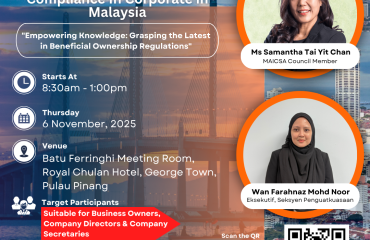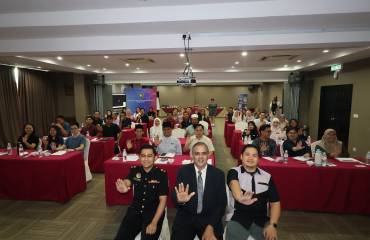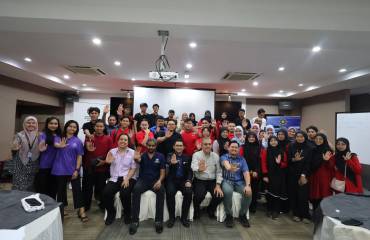
The CPI results announced by Transparency International-Malaysia (TI-M) on 27th January 2016 revealed that Malaysia’s CPI score worsened from 52 to 50 (maximum score = 100) and the country’s ranking also dropped from 50th to 54th place. According to Dato’ Akhbar Satar, President of TI-M, Malaysia’s position would have been worse if seven* well-performing countries were included in the 2015 CPI Index.

Corruption among officers in the civil service given that the public expects high ethical standards of conduct and accountability from all government officials and staff. CPI is not only about comparing the bribes reported and the number of prosecutions on corruption court cases but also how effective the government machinery is in investigating and exposing corruption.
The President explained that the CPI is a global aggregate index which captures the perceptions of business leaders – local and foreign – from multinational companies (MNCs), investors and entrepreneurs on the level of corruption in the public sector of 168 countries* (175 countries participated in the 2014 survey). It is a composite index which sources its information from opinion surveys and expert assessments from independent institutions in the past 24 months. The Malaysian CPI used eight surveys and country assessments.
On an overall basis, two-thirds of the 168 countries surveyed scored below 50, on a scale from 0 (perceived to be highly corrupt) to 100 (perceived to be very clean). Denmark comes out on top in 2015 CPI with a score of 91, helped with its implementation of strong access to information systems and rules governing the behaviour of those in public positions followed by Finland (90), Sweden (89), New Zealand (88), Netherlands (87) and Norway (87) while North Korea and Somalia again shared last place, scoring just eight.
In terms of ASEAN countries, Indonesia and Thailand made significant improvements in their CPI scores and ranking in comparison to previous years. Though both the countries continue to score lower than Malaysia, their level of improvement in comparison to past years is commendable. On the contrary, Malaysia has drifted downwards in 2015 in terms of the CPI score and only managed to maintain similar scores in the previous two years.
What are some of the factors that caused the slide in Malaysia’s performance? According to Dato’ Akhbar Satar, the country has been plagued by various controversial issues such as 1MDB, the RM2.6 ‘donation’ to the Prime Minister’s personal bank account, the transfer of certain Malaysian Anti-Corruption Commission (MACC) officers, the sudden sacking of the Special Branch Officer and the raiding of the MACC offices by the Police. All these happenings shed a poor light on the country.
Hence despite the many measures being implemented under the NKRA’s Government Transformation Programme (GTP) initiative, the perception of corruption in Malaysia does not seem to be lessening but worsening.
In the press conference, the President of TI-M emphasised that the Malaysian Government must take the bull by the horns and implement the following immediately in order to address corruption:-
- The government must provide the leadership and strong political will to drive the message of zero tolerance for graft. Expectations from the public are high in terms of high ethical standards (conduct and accountability) from all three branches of the government namely executive, judiciary and legislative;
- Tackling political corruption and reforming the financial sector should be a top priority, Hence the urgent need to develop a practical and realistic formula/mechanism to regulate political financing which has gone out of hand.
- Reforming the Malaysia Anti-corruption Commission (MACC) – to give it more autonomy and independence from the executive in order for it to perform its job more effectively and efficiently;
- Malaysia needs to speedily adopt the UN Convention against Corruption (UNCAC) fully
- Malaysian Government to criminalize and enforce against passive foreign bribery; and
- Making governments more transparent by joining the Open Government Partnership (OGP) membership.
We simply cannot continue to allow our public sector officials to continue to carry on their corrupt practices with impunity. The court of public opinion strongly feels that ‘enough is enough’ and that stern and uncompromising measures need to be taken to combat the deteriorating situation in the country.
(for full report please visit http://www.transparency.org/cpi2015)










